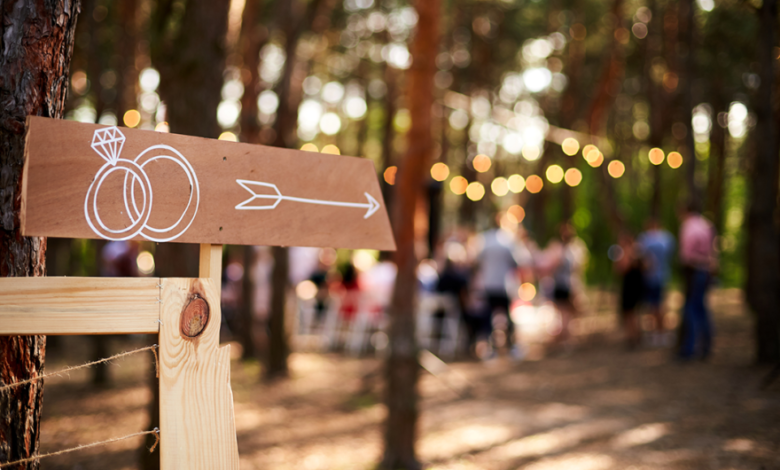The Ultimate Guide to Budgeting Your Wedding Without Breaking the Bank

Weddings are notoriously expensive, but this doesn’t mean you should take out a loan or spend all your savings. With thoughtful planning and a clear budget, you can have a memorable day without breaking the bank.
For example, you can set up a website and launch a crowdfunding campaign or ask for money as a wedding gift. And no, you don’t have to hire a developer or web designer, which would only add to the costs. Instead, use wedding website templates to create a beautiful site yourself and start a cash fund.
Meanwhile, find ways to cut unnecessary expenses. Even little things like sending digital invitations and hitting up thrift stores for decorations can save you hundreds or thousands of dollars. Go one step further and limit the guest list to reduce costs.
Feeling overwhelmed? To help you out, we’ve compiled a guide on how to plan your dream wedding without the sky-high price tag. Let’s dive in.
TL;DR
- The average wedding costs approximately $36,000, leading 56% of couples to borrow money for the occasion, with many regretting their spending decisions.
- Create a realistic budget by considering all expenses and maintaining a financial cushion for unexpected costs.
- Focus spending on what truly matters to you as a couple; cutting your guest list can save $91,500 or more.
- Eliminate unnecessary expenses like wedding favors and opt for digital invitations to save significant costs.
- Seek discounts on bundled services and consider DIY options to stay within budget while having a memorable celebration.
Create a Wedding Budget in X Simple Steps
The average cost of a wedding is approximately $36,000, depending on location, services, and number of guests. Expect to pay around $21,500 for a wedding with 50 to 75 guests and $45,000 or higher for one with 150 to 200 guests.
Given these figures, it’s no wonder so many couples start their life together in debt. According to a U.S. News survey, 56% of newlyweds borrowed money to pay for their wedding day. The worst part? Nearly one-third regret how much they spent.
Believe it or not, it’s possible to have a stunning wedding on a budget—you just need to think outside the box and plan things out. Simply follow these steps:
1. Set a Realistic Budget
First, determine how much you have to spend. Consider your savings and other funding sources, such as family contributions.
Next, subtract daily living expenses like rent, clothing, groceries, and credit card payments, as well as any upcoming costs.
For example, you might be considering buying a house in the coming months or years. Would you rather spend on a lavish wedding that lasts a day, or put that money toward a down payment that secures your future?
Also, keep some buffer money for unforeseen expenses. 35% of the newlyweds surveyed by U.S. News said they spent more than originally planned. Therefore, you’ll want to build a financial cushion into your budget for things like hidden vendor fees and overtime charges.
If you’re looking for ways to stay within your budget without sacrificing quality, consider exploring pre-owned options for jewelry and accessories. You can learn more about Twice Loved to discover stunning pre-loved engagement rings that offer timeless beauty at a fraction of the cost.
2. Create a Wedding Budget Checklist
Once you have a budget in place, make a list of spending categories to understand where your money goes. These may include:
- Venue (rental, setup, and cleanup fees)
- Attire (e.g., wedding dress, engagement party outfits, footwear)
- Beauty (e.g., hair and makeup, facials, waxing)
- Food and beverages
- Wedding cake
- Favors and party gifts
- Flowers and decorations
- Photography services
- Entertainment
- Stationery (e.g., wedding invitations)
- Transportation
- Miscellaneous fees
Expect to pay around $12,200 for the wedding venue, $2,900 for photography services, and $1,700 to $2,100 for entertainment. The average cost of catering is $80 per person, but you may end up paying extra for locally sourced produce, gluten-free foods, vegan meals, or other special services.
Use our wedding budget calculator to get a rough estimate. Enter your budget, guest count, and the money allocated to each spending category, then click “Calculate.”
3. Define Your Priorities
Your wedding is your special day, and you shouldn’t spend on things you don’t want or need. Focus on what matters to you as a couple, even if that means breaking tradition.
More than half of the couples surveyed by U.S. News said they regret overspending on certain services, including:
- Venue rental (21%)
- Food (19%)
- Beverages (16%)
- Wedding cake (15%)
- Gifts for guests (17%)
- Entertainment (15%)
Do you want to make the same mistake? Probably not.
Let’s assume you want a small, private wedding with 40-50 guests, but your parents are pushing for a 200-person guest list.
In 2024, newlyweds paid around $610 per wedding guest, meaning you could save a whopping $91,500 to $97,600 by doing things your way. The savings could go toward your honeymoon, home, or business and generate value for years to come.
That said, define your top three priorities—and take it from there. If, say, you want to splurge on the venue, then allocate more money to it and save in other areas.
4. Cut Unnecessary Expenses
Extras like wedding favors, photo booths, and save-the-date cards can cost thousands of dollars, despite being largely unnecessary. The same goes for the rehearsal dinner, hair and makeup trial runs, custom invites, extravagant floral arrangements, pre-wedding spa days, and other stuff.
For example, most people who attend a wedding couldn’t care less about party favors. These are often left behind at the reception or tossed in a drawer the next day—if they even make it home.
Similarly, wedding invitations, save-the-dates, and other stationery are pretty much useless. You could save hundreds, if not thousands, by going digital. Go one step further and create a wedding website to share the event details, manage guest lists, track RSVPs, and upload photos.
Another way to cut costs is by renting a wedding dress. Let’s be real—you’ll likely wear it once for just a few hours. Unless you’re set on splurging, buying new doesn’t make much sense.
Also, consider your guest count when planning the menu. This step alone can save you thousands of dollars and reduce food waste.
Looking for budget-friendly ways to add personality to your décor? You might want to consider adding a neon sign to your wedding reception, a modern, cost-effective statement piece that brings energy and style without straining your budget.
5. Be Aware of Hidden Costs
Remember when we told you to put money aside for unexpected expenses? Wedding vendors charge all sorts of fees, and some are not obvious.
Let’s see a few examples:
- Taxes and service charges
- Marriage license fees
- Cake tastings
- Out-of-season flowers
- Valet parking
- Vendor trials
- Venue cleanup
- Tips and gratuities
- Vendor meals
For instance, coat check and valet parking services can add a few hundred bucks to your bill. Cake tastings run around $25 per person, while weather-related items like blankets, umbrellas, and sunscreen cost $200 to $500 or more.
These expenses can pile up fast, making it difficult to stick to your budget. That’s why it’s important to ask for a full cost breakdown upfront and plan accordingly.
Get the Most Out of Your Wedding Budget
No matter your budget, you can have a memorable wedding that won’t leave you starting married life in debt. Set your priorities straight, plan in advance, and skip the extras. Watch out for hidden fees and track every expense to keep your finances in check.
Also, seek ways to save money. For instance, many vendors offer discounts on bundle packages like photography and videography or venue rental and catering services. All you need to do is ask about it.
Last but not least, take the DIY route where it makes sense. Do your own hair and makeup—or ask a friend to help you out, craft your own decorations, and arrange the flowers yourself. You could also set up a DIY photo booth, skip the DJ and create curated Spotify playlists, and bake your wedding cake at home.
Remember, this special day is all about you and what truly makes you happy, not how much you spend. Sure, you want to make a good impression, but this shouldn’t be done at the expense of your financial well-being. Be smart with your budget so you can start your new life on the right foot.
FAQ
What is the average cost of a wedding?
The average cost of a wedding is approximately $36,000, but this can vary depending on factors such as location, services, and the number of guests. For example, a wedding with 50 to 75 guests may cost around $21,500, while a larger wedding with 150 to 200 guests can exceed $45,000.
How can I create a realistic wedding budget?
To create a realistic wedding budget, start by determining the total amount you have available, including savings and potential contributions from family. Subtract your daily living expenses and any anticipated larger expenses, like future housing costs, from this total. It’s also essential to include a financial cushion for unexpected costs, as 35% of newlyweds report spending more than they initially planned.
What are some effective strategies for cutting wedding costs?
To cut wedding costs, consider eliminating unnecessary expenses such as wedding favors, digital invitations, and extravagant decorations. Prioritize your spending by focusing on what matters most to you and potentially limiting your guest list, as this can lead to significant savings. Additionally, explore DIY options for decorations and personal services to enhance savings while making your wedding unique.
What should I include in my wedding budget checklist?
Your wedding budget checklist should include categories such as venue rental, attire, beauty services, food and beverages, wedding cake, favors, flowers, photography, entertainment, stationery, transportation, and any miscellaneous fees. This will help you understand where your money is going and ensure all aspects of your wedding are accounted for.
How can I avoid hidden costs when planning my wedding?
To avoid hidden costs, it’s crucial to ask wedding vendors for a comprehensive cost breakdown upfront, including taxes, service charges, and any additional fees for services. Planning for unexpected expenses, such as marriage license fees or specific vendor trials, can also help you stay within budget. Keep track of every expense and continuously adjust your budget as necessary.




